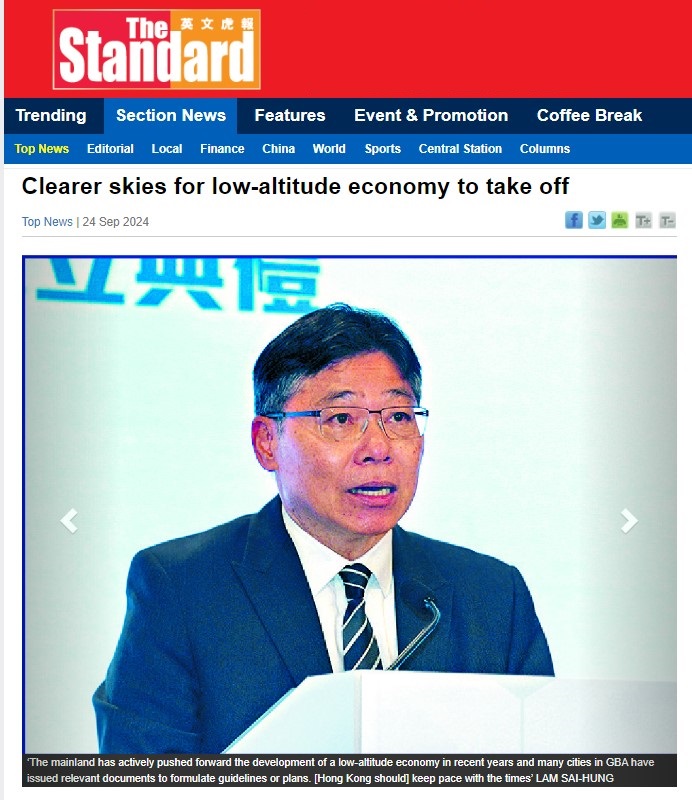The Standard - Clearer skies for low-altitude economy to take off

The Standard - Clearer skies for low-altitude economy to take off
Hong Kong is removing barriers and loosening policy restrictions to prepare for the development of a low-altitude economy while also taking into account the mainland's practical experiences and reviewing feasible pilot programs, says Secretary for Transport and Logistics Lam Sai-hung.
Lam, speaking at a forum on new quality productive forces yesterday at the Hong Kong Convention and Exhibition Centre, said Hong Kong will promote a low-altitude economy with other cities in the Greater Bay Area to fully synchronize with the national development strategy.
A low-altitude economy is an integrated economic model that encompasses civil piloted and unpiloted aviation activities within an airspace extending up to 3,000 meters.
"The mainland has actively pushed forward the development of a low-altitude economy in recent years and many cities in GBA have issued relevant documents to formulate guidelines or plans," Lam said.
To remain competitive, Hong Kong should "keep pace with the times."
The central government proposed to develop general aviation and low-altitude economy in the Third Plenary Session of the 20th Central Committee of the Communist Party of China in July.
It is expected that the domestic market size for the low-altitude economy will reach 3 trillion yuan (HK$3.31 trillion) to 5 trillion yuan by next year.
Lam admitted that developing a low-altitude economy would be complex in Hong Kong due to its special landform and dense population.
He said the Transport and Logistics Bureau is collaborating with other departments to remove barriers and loosen restrictions under various policies to promote low-altitude activities.
"According to past experiences, other cities in the GBA started developing the low-altitude economy by building industry parks and launching pilots," Lam noted.
"Hong Kong will also implement pilot projects step by step and gradually expand and enrich the application scenarios of advanced aerial transportation systems."
The Civil Aviation Department will work with Lam's bureau to review feasible pilot programs.
Hong Kong authorities are meeting with mainland officials - including those from the Civil Aviation Administration of China Central and Southern Regional Administration - and drone operators to arrange inspections of their unmanned aerial systems.
"This will help us keep track of the latest developments in low-altitude economy in the mainland as well as strengthen cross-border technological docking and promote coordinated economy development in the GBA," Lam said.
Meanwhile, an alliance for low-altitude economy development in the GBA was officially established by the Democratic Alliance for the Betterment and Progress of Hong Kong and Smart City Consortium to coordinate with various stakeholders.
The alliance submitted a proposal to the administration suggesting it to speed up low-altitude economic development through measures such as allowing mutual recognition of talent and technology between Hong Kong and the mainland, building a trial flight base and developing cross-border low-altitude commerce.
DAB lawmaker Elizabeth Quat Pei-fan urged authorities to set up an inter-departmental task force for developing a low-altitude economy.
Quat said at the forum that the policies and regulations regarding a low-altitude economy are not yet comprehensive and the administration should work to connect with other GBA cities and set up cross-city low-altitude air routes.
This email address is being protected from spambots. You need JavaScript enabled to view it.
原文網址:https://www.thestandard.com.hk/section-news/section/11/266427/
